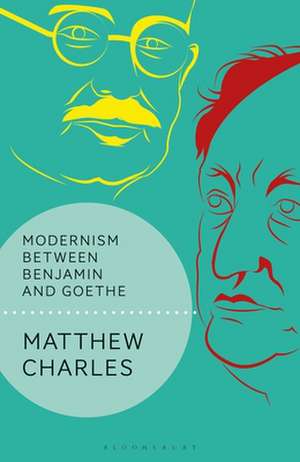Modernism Between Benjamin and Goethe: Walter Benjamin Studies
Autor Matthew Charlesen Limba Engleză Paperback – 16 iun 2021
| Toate formatele și edițiile | Preț | Express |
|---|---|---|
| Paperback (1) | 217.53 lei 6-8 săpt. | |
| Bloomsbury Publishing – 16 iun 2021 | 217.53 lei 6-8 săpt. | |
| Hardback (1) | 656.73 lei 6-8 săpt. | |
| Bloomsbury Publishing – 11 dec 2019 | 656.73 lei 6-8 săpt. |
Preț: 217.53 lei
Preț vechi: 274.82 lei
-21% Nou
Puncte Express: 326
Preț estimativ în valută:
41.62€ • 43.58$ • 34.52£
41.62€ • 43.58$ • 34.52£
Carte tipărită la comandă
Livrare economică 10-24 aprilie
Preluare comenzi: 021 569.72.76
Specificații
ISBN-13: 9781350267374
ISBN-10: 1350267376
Pagini: 240
Dimensiuni: 156 x 234 mm
Greutate: 0.34 kg
Editura: Bloomsbury Publishing
Colecția Bloomsbury Academic
Seria Walter Benjamin Studies
Locul publicării:London, United Kingdom
ISBN-10: 1350267376
Pagini: 240
Dimensiuni: 156 x 234 mm
Greutate: 0.34 kg
Editura: Bloomsbury Publishing
Colecția Bloomsbury Academic
Seria Walter Benjamin Studies
Locul publicării:London, United Kingdom
Caracteristici
Emphasizes the centrality of Goethe's philosophy for Walter Benjamin's thought, offering an original interpretation of his work
Notă biografică
Matthew Charles is a senior lecturer in cultural and critical theory at the University of Westminster, UK. He is the co-author of the Stanford Encyclopedia of Philosophy entry on Walter Benjamin and several articles and chapters on critical theory and education.
Cuprins
Introduction: Perverse Antiques 1. Criticism, Transdisciplinarity and Transcriticism: Walter Benjamin and the Kantian Traditioni. Literary Criticism and Aesthetic Judgementii. Transcriticism and Non-Synthetic Judgementiii. Contingent Criticism and Teleological Judgement2. Weak Messianism in German Romanticism i. Literary Criticism as Messianic Reflectionii. Weak Messianism: Formalism, Affirmationism, Singularityiii. Aestheticentricism and Problems of the Romantic Imagination 3. Strong Aesthetics in Goethe's Tender Empiricism i. Aesthetics of Science: Critique of Sensibilityii. Teleological Pessimism: Ephemerality and Multiplicity4. Pure Content: the Ephemerality of Colouri. Goethe's Colour Theory: Natureii. Benjamin's Colour Theory: Phantasyiii. Expressionist Colour (I): Grünewald and Maréesiv. Expressionist Colour (II): Klee and Turner5. Pure Expression: the Violence of Criticism i. Translating the Pure Wordii. Expressionist Language (I): Goethe's Elective Affinitiesiii. Expressionist Language (II): T. E. Hulme's Imagist poetry6. Pure History: the Untimeliness of Technology i. Goethe's Untimeliness: Nietzsche, Koselleck and Benjamin ii. Expressionist Technology (I): Klages, Marx and the Soviet Avant-Garde iii. Expressionist Technology (II): Cinematic Modernism in Goethe's Faust Afterword: All that is ephemeral. becomes an Event
Recenzii
Modernism Between Benjamin and Goethe is an exhilarating assembling of voices. At its core is Goethe speaking across a century to Benjamin. Poles apart, such tensity leads to attraction, expressed in multiple affinities; divided by time, while untimeliness transfers energy to the analysis. Matthew Charles symphonizes beautifully this convocation of the Romantic, the Classical and the Modern.
In this well-informed and wide-ranging investigation, Matthew Charles presents a complex Goethean perspective for the reading of Walter Benjamin and for modernist studies generally. His is a Goethe who has passed through the afterlives of Romanticism, making possible a post-romantic classicism positioned beyond the classical antinomies.
In this well-informed and wide-ranging investigation, Matthew Charles presents a complex Goethean perspective for the reading of Walter Benjamin and for modernist studies generally. His is a Goethe who has passed through the afterlives of Romanticism, making possible a post-romantic classicism positioned beyond the classical antinomies.








